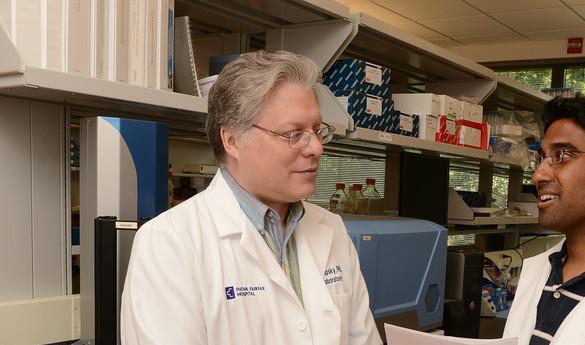Mason students pursue neuroscience internships with local hospital
George Mason University neuroscience students have been given the opportunity to pursue hands-on projects in a professional work setting.
The semester-long Inova Biomedical Internship Program in Neuroscience, coordinated by Mason and Inova Fairfax Hospital, grants students access to scientists and medical care providers who serve as research mentors.
Dr. Beverly Walters, Inova’s director of clinical research, and Dr. Robert Lipsky, Inova’s director of translational research, developed the program together. Both work as affiliate professors of molecular neuroscience at Mason’s Krasnow Institute.
“By temperament, I love to teach,” Walters said. “We have the responsibility to teach research to anyone interested in learning.”
According to Walters, the internship provides students with knowledge of the structure of clinical research and associated research skills, such as analyzing statistics and delivering conference presentations.
Walters emphasizes how the internship program helps students become critical thinkers.
“Even if students don’t pursue a research career, critical thinking is still essential when reading medical literature,” Walters said. “It’s a taste of the real world.”
Senior Elizabeth Benkert, a neuroscience major, enjoyed participating in the internship last year alongside ten other students.
“I was really interested in neuroscience,” Benkert said. “I wanted to find out anything and everything I could.”
The program also helped Benkert develop her career goals.
Although Benkert may still consider studying to become a physician’s assistant, the program enabled Benkert to realize her potential in clinical research.
One of Benkert’s current research projects involves studying the Merci and Penumbra devices, which are methods of medical intervention for stroke patients.
The Inova Biomedical Internship Program is an intellectual growth experience for students involved.
“Students knew nothing when they started the internship,” Walters said. “But when they finish in four months, they are quite accomplished.”
At the program’s conclusion, all interns deliver a poster presentation on their research.
“It is thrilling to see people, who did not know much at first, stand up and speak authoritatively on their topic,” Walters said.
During her internship, Benkert especially enjoyed collaborating with like-minded undergraduates.
“It was a nice confidence boost to be around people so similar,” Benkert said.
Student interns at Inova tend to continue conducting research once the internship has concluded.
For example, in December 2013, Benkert will be applying to present at a 2014 American Heart Association conference. Benkert also intends to pursue a Ph.D. in neuroscience.
Walters encourages students from a variety of academic disciplines to apply for the internship program in future semesters.
“We have undergraduate students from the College of Science currently, but we could have students from any discipline at all,” Walters said. “There is almost nothing off limits.”
Looking back, Benkert considers the Inova Biomedical Internship Program in Neuroscience an invaluable and humbling experience.
“It opened my eyes to new career possibilities,” Benkert said. “It pushed me to do new things that I didn’t think I could do before.”
Prospective interns can learn more about the program here.

